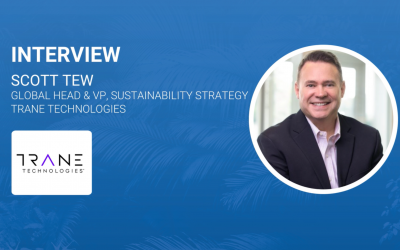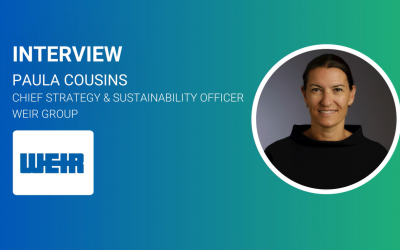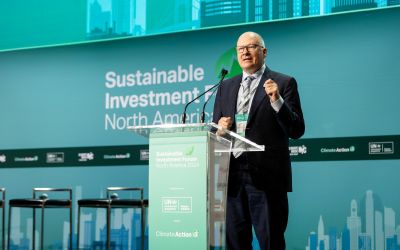Valeria Dinershteyn CFA on the increasing demand for ESG incorporation in Fixed Income strategies
Ahead of the Virtual Edition of the Sustainable Investment Forum Europe, a 4-Part Digital Event Series starting from 8 September, we caught up with Valeria Dinershteyn CFA, Senior Sustainability Strategist at Northern Trust Asset Management, to discuss the increasing demand for ESG incorporation in Fixed Income strategies.

Ahead of the Virtual Edition of the Sustainable Investment Forum Europe, a 4-Part Digital Event Series starting from 8 September, we caught up with Valera Dinershteyn CFA, Senior Sustainability Strategist at Northern Trust Asset Management, to discuss the increasing demand for ESG incorporation in Fixed Income strategies.
How have you seen demand for ESG Fixed Income solutions shift in recent years?
Over the past three decades, the majority of ESG investment solutions have been applied to equity strategies. However, today fixed income ESG solutions represent 33% of the €27 trillion assets in ESG strategies globally1 with the last decade seeing a growing demand result in positive flows into this space. The lack of availability of quantitative ESG data, tools & technology as well as how to integrate them with traditional fixed income investment processes all played a role in the delayed development. With fixed income being such a large component of most institutional investor strategies, the opportunity to develop ESG solutions across the term and credit spectrum is tremendous – and much of it driven through co-development with institutional investors and investment managers working together.
Source: Global Sustainable Investment Alliance (2018 GSI review)
How does the implementation of a Fixed Income ESG strategy contribute to portfolios overall performance?
Based on our research, incorporating ESG criteria in a credit portfolio has the potential to make a positive contribution to both risk and return. Issuers with higher ESG ratings have similar characteristics to higher-quality credit issuers, but no statistical link. Based on these similarities, we believe there is additional information that can be captured by integrating ESG into a fixed income strategy.
Issuers with higher ESG ratings generally have larger capital structures, longer durations and trade at tighter spreads. Our historical testing has shown evidence that higher-rated ESG issuers outperform their lower-rated counterparts during periods of credit spread widening, such as those seen during the Global Financial Crisis and the European Sovereign Debt Crisis. This leads us to believe there is additional information contained in ESG analysis – not captured in traditional credit analysis – that can be used to mitigate downside risk.
Amidst the extreme volatility seen in the first half of 2020, ESG leaders outperformed ESG laggards across multiple markets. In addition to this outperformance those leaders also traded at tighter spreads during the market turmoil despite there being only a loose correlation between ESG profiles and credit ratings. With fixed income being a control asset this characteristic is an important factor for investors to consider when looking for consistency in downside mitigation.
How Do You See ESG in the Post-Pandemic World?
While strong financial metrics remain the foundation of an issuer’s creditworthiness, we believe investors will continue to incorporate non-financial metrics into their evaluation process to help mitigate downside risks. The combination of supply and demand shocks means the global economy may shrink by 3% in 2020, according to the International Monetary Fund[VD1] [VD2] [VD3] . Some of these concerns are already considered by credit rating agencies. However, based on the performance spread of ESG bonds during this episode, the market may not be pricing all the ESG risks in bond portfolios.
Credit markets continue to be under a lot of stress with high yield spreads trading at historically high levels due to the solvency concerns in the energy sector as well as other sectors directly impacted by the pandemic. Significant fiscal stimulus by governments and monetary support from central banks across developed and emerging economies should aid credit markets, but there will be some winners and losers coming out of this crisis. We believe that combining targeted quality factor exposures with ESG metrics will help to enhance returns and manage both financial and non-financial risks.
Important Information
This material is directed to eligible counterparties and professional clients only and should not be relied upon by retail investors. The information is not intended for distribution or use by any person in any jurisdiction where such distribution would be contrary to local law or regulation. Northern Trust and its affiliates may have positions in and may effect transactions in the markets, contracts and related investments different than described in this information.
Investing involves risk- no investment strategy or risk management technique can guarantee returns or eliminate risk in any market environment. Simulated past performance and actual past performance is no guarantee of future results.
Northern Trust Asset Management is composed of Northern Trust Investments, Inc. Northern Trust Global Investments Limited, Northern Trust Fund Managers (Ireland) Limited, Northern Trust Global Investments Japan, K.K, NT Global Advisors Inc., 50 South Capital Advisors, LLC and investment personnel of The Northern Trust Company of Hong Kong Limited and The Northern Trust Company.
The Virtual Edition of the Sustainable Investment Forum Europe 2020 will take place on the 8th, 11th, 15th and 22nd September 2020. Secure your place today by registering for free here.






